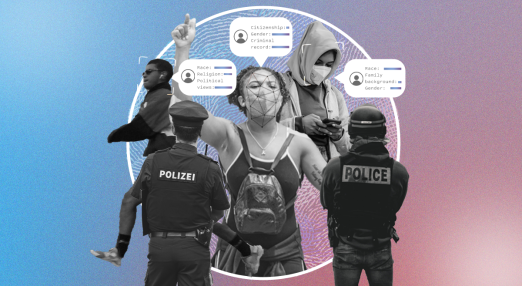Portugal: Constitutional Court strikes data retention down
On 19 April 2022, at the request of the Ombudsperson, the Portuguese Constitutional Court declared the unconstitutionality of the Portuguese data retention law.
Filter resources
-

Portugal: Constitutional Court strikes data retention down
On 19 April 2022, at the request of the Ombudsperson, the Portuguese Constitutional Court declared the unconstitutionality of the Portuguese data retention law.
Read more
-

Europol’s new powers will enable Big Data analysis and mass surveillance. We say NO!
The European Parliament is soon to vote on the new Europol reform which aims to expand the law enforcement agency’s powers without any accountability and with as few fundamental rights safeguards as possible. To influence the vote, EDRi has mobilised civil society organisations in a joint advocacy action of reaching out directly to members of the European Parliament to urge them to vote against the proposal.
Read more
-

Europol’s reform: A future data black hole in European policing
The European Parliament is soon due to vote on the powers expansion of the European Union’s law enforcement agency, Europol. Civil society has been extremely critical of Europol’s mandate revision, raising many concerns with regards to the lack of fundamental rights protections and policymakers’ blind and absolute trust in how the agency will use its new powers. All the more reasons to be worried: the result of the trilogue negotiations with the Council of the EU made it even worse.
Read more
-

About ClearviewAI’s mockery of human rights, those fighting it, and the need for EU to intervene
Clearview AI describes itself as ‘The World’s Largest Facial Network’. However, a quick search online would reveal that the company has been involved in several scandals, covering the front page of many publications for all the wrong reasons. In fact, since New York Times broke the story about Clearview AI in 2020, the company has been constantly criticised by activists, politicians, and data protection authorities around the world. Read below a summary of the many actions taken against the company that hoarded 10 billion images of our faces.
Read more
-

Criminal complaint against illegal export of surveillance software is making an impact: the FinFisher group of companies ceases business operations after its accounts are seized by Public Prosecutor’s Office
Following a criminal complaint filed by the Society for Civil Rights (Gesellschaft für Freiheitsrechte e.V.), Reporters without Borders (RSF), the European Center for Constitutional and Human Rights (ECCHR) and netzpolitik.org over illegal exports of surveillance software, the Munich-based corporate group FinFisher has ceased its business operations. The Public Prosecutor’s Office Munich announced that it had seized the company’s accounts, after which FinFisher GmbH and two partner companies filed for insolvency.
Read more
-

The Clearview/Ukraine partnership – How surveillance companies exploit war
Clearview announced it will offer its surveillance tech to Ukraine. It seems no human tragedy is off-limits to surveillance companies looking to sanitise their image.
Read more
-

Spying on couriers and AdTech using data from operators. We know the winners of the Czech Big Brother Awards
For the seventeenth time has the Czech NGO and EDRi member Iuridicum Remedium (IuRe) awarded Big Brother Awards to those who have been snooping the most into our privacy in the past year.
Read more
-

The Digital Markets Act promises to free people from digital walled gardens
Last night, 24 March, the European Union made a great step forward to better protecting our rights online as it approved the political trilogue compromise for the Digital Markets Act (DMA). This decision promises to challenge the strongly centralised environment of Big Tech platforms exerting too much power over our rights and over the flow of information in society. Tech companies like Facebook, Google, Amazon and Apple will have to start following strict rules that ensure free and fair competition in the digital markets.
Read more
-

EU AI Act needs clear safeguards for AI systems for military and national security purposes
EDRi affiliate ECNL presents the second set of their proposals on exemptions and exclusions of AI used for military and national security purposes from the AIA, also endorsed by European Digital Rights (EDRi), Access Now, AlgorithmWatch, ARTICLE 19, Electronic Frontier Finland (EFFI), Electronic Privacy Information Center (EPIC) and Panoptykon Foundation.
Read more
-

Italian DPA fines Clearview AI for illegally monitoring and processing biometric data of Italian citizens
On 9 March 2022, the Italian Data Protection Authority fined the US-based facial recognition company Clearview AI EUR 20 million after finding that the company monitored and processed biometric data of individuals on Italian territory without a legal basis. The fine is the highest expected according to the General Data Protection Regulation, and it was motivated by a complaint sent by the Hermes Centre in May 2021 in a joint action with EDRi members Privacy International, noyb, and Homo Digitalis—in addition to complaints sent by some individuals and to a series of investigations launched in the wake of the 2020 revelations of Clearview AI business practices.
Read more
-

Private communications are a cornerstone of democratic society and must be protected in online CSAM legislation
On 17 March 2022, EDRi and 34 other civil society organisations jointly raised our voices to the European Commission to demand that the forthcoming EU ‘Legislation to effectively tackle child sexual abuse’ complies with EU fundamental rights and freedoms. We are seriously concerned that the draft law does not meet the requirements of proportionality and legitimacy that are rightly required of all EU laws, and would set a dangerous precedent for mass spying on private communications.
Read more
-

Open letter: Protecting digital rights and freedoms in the Legislation to effectively tackle child abuse
EDRi is one of 52 civil society organisations jointly raising our voices to the European Commission to demand that the proposed EU Regulation on child sexual abuse complies with EU fundamental rights and freedoms. You can still add your voice now!
Read more
